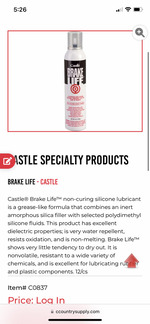Hello. I have 200,000 miles on my 08 AWD highlander and I am having some pretty rough clunking and what not coming from the rear when going over bumps. I’m almost sure the original struts are done. In looking around other the internet it seems the KYB SR4447 is a popular OEM equivalent replacement.
I have 2 questions:
1) Is that part one you folks would suggest? 2) How hard of a replacement is this? From the videos I’ve seen there is no need to compress the spring and it’s simply nuts and bolts which I’m confidant I can handle.
Thanks I’m advance for any assistance.
I have 2 questions:
1) Is that part one you folks would suggest? 2) How hard of a replacement is this? From the videos I’ve seen there is no need to compress the spring and it’s simply nuts and bolts which I’m confidant I can handle.
Thanks I’m advance for any assistance.

